Colgate University set an institutional record for the highest number of applicants ever. Meet some of the accepted students from the Class of 2026.
When Colgate set an institutional record for the highest number of applicants ever — 21,261 — only 12% would be accepted into the Class of 2026. The enrolled, totaling 841, broke their own record: They are the most selective and academically accomplished class in the history of the University.
Meet eight of those first-years, who discuss their backgrounds, why they chose Colgate, and their goals for the next three years:
Dual Roles
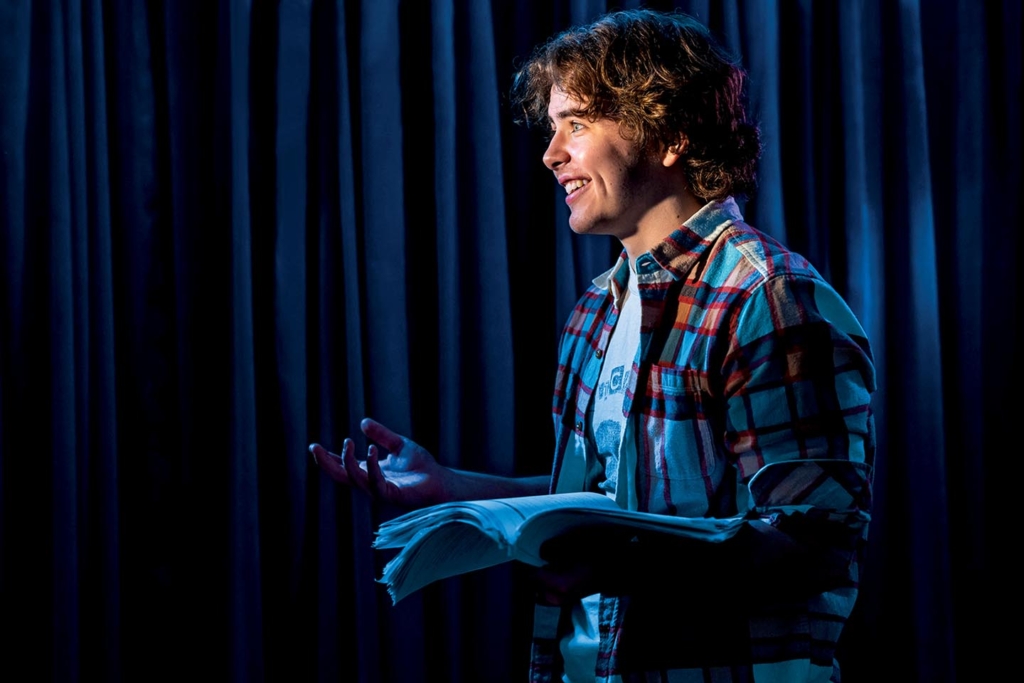
Tanner Harmon has had two surprises since arriving at Colgate last fall. He was selected for the lead role in the Masque & Triangle spring production, Something Rotten!, and he’s been appointed to head the Grappling Club next fall. For a first-year who’s new on the scene, he’s already making strides.
This performer/athlete persona isn’t everything there is to know about Harmon, but it’s a central part of his identity. In fact, he wrote about the duality of being a self-described “theater kid” and football captain in his admission essay. “I spent half the year around muscle-bound monsters and impressive athletes, and the other half with a collection of dedicated actors and talented performers,” he wrote. “Summer and autumn have always meant shoulder pads and cleats. Winter and spring have always meant costumes and microphone tape.” Now, at Colgate, he’s able to do both year-round.
Having grown up in Whitefish, Mont., Harmon chose Colgate because he saw the surrounding area’s natural- playground potential. His hometown is considered a gateway to Glacier National Park, so he grew up hiking and mountain biking. “We’re near so much stuff to do outdoors here; coming from Montana, that’s a big thing for me,” he says. “But also, meeting full need is kind of a big deal.”
Inside the classroom, he’s been invigorated by philosophy (which he is considering as a double major with economics) and art.
“I’ve always been a philosophy head,” Harmon says. Taking Challenges of Modernity with David Dudrick, who is the George Carleton Jr. Professor of philosophy, and having office chats with Dudrick about Hegel and Nietzsche have further fueled that interest.
Harmon has found similar intellectual stimulation with Professor of Art and Art History Elizabeth Marlowe. Appraising the two professors, he says, they’re “super engaged.” Knowing “a PhD academic who’s happy to talk with me at my level… I’ve been really happy with that.” Harmon has also been using his graphic design skills to contribute to Marlowe’s current book project.
As for his peers, he has found friends in both the performers and the athletes, like in high school. He’s a member of ETC, the sketch comedy group; he’s also finding like-minded people in the Grappling Club, which combines wrestling and Brazilian jiujitsu. With both pursuits, he says, “there’s something with being engaged with another person that is a feeling you don’t get anywhere else.”
In the Name of Music

Sahana Savarkar grew up in New Delhi, India, singing in Sanskrit and studying Indian classical music. At Colgate, she’s a member of the Swinging ’Gates, and the walls of her room are decorated with posters from alternative and indie rock musicians like Phoebe Bridgers, Nirvana, and Nine Inch Nails.
Savarkar is new to a cappella, but she’s been well versed in other types of American music and culture since childhood. “I probably know more about American music than some American kids,” she jokes. “That’s mostly because of my interest in music, but it’s [also] very accessible on the internet.”
She was raised in a musical household and began learning music at age 3. In high school, she veered from her lessons in Indian classical music and began composing and producing music that sounds more similar to the American groups she listens to today.
English is her first language, but she’s fluent in Hindi and Marathi. Savarkar knew she wanted to attend college in the U.S. and learned about Colgate through family friend Jailekha Zutshi ’21, so she applied early decision.
More about Savarkar:
Her first name is a musical scale, called a raag in Indian classical music. “Within each musical scale, we have variations for the do, re, mi, fa [etc.] notes,” she explains. “We have different raags that songs are composed in, and Sahana is one of those.”
Two weeks before leaving India for Colgate: She gave a staged, solo performance in Bharatanatyam, a dance of expression, music, and rhythm. It was her final assessment in the dance she’s been learning since age 9. Savarkar’s performance included the story of the Mahabharata, a Hindu epic. “It’s pretty fantastical,” she says. “There are a lot of gods and they have powers, and there’s a war and it’s very dramatic.” Wearing an intricate, five-piece costume, she had to portray the characters and their range of emotions.
Favorite class so far: The Science of Music, with her adviser, Assistant Professor Ryan Chase. “We learned a lot of music theory, which is something I had never done, and we analyzed different kinds of songs. We’d listen to Mozart, and we once listened to a Kendrick Lamar song because we were learning about quadratures.”
Savarkar plans to major in physics and minor in math, economics, or music. “I really like the academics here,” she says. “They’re hard, especially the STEM subjects, but professors have been easy to confide in and ask questions. And I’ve found that studying in groups really helps. I’ve made a lot of good friends; we are all struggling with physics, but we share that struggle together, which makes it more bearable and it makes physics more achievable.”
More Than Just a Number
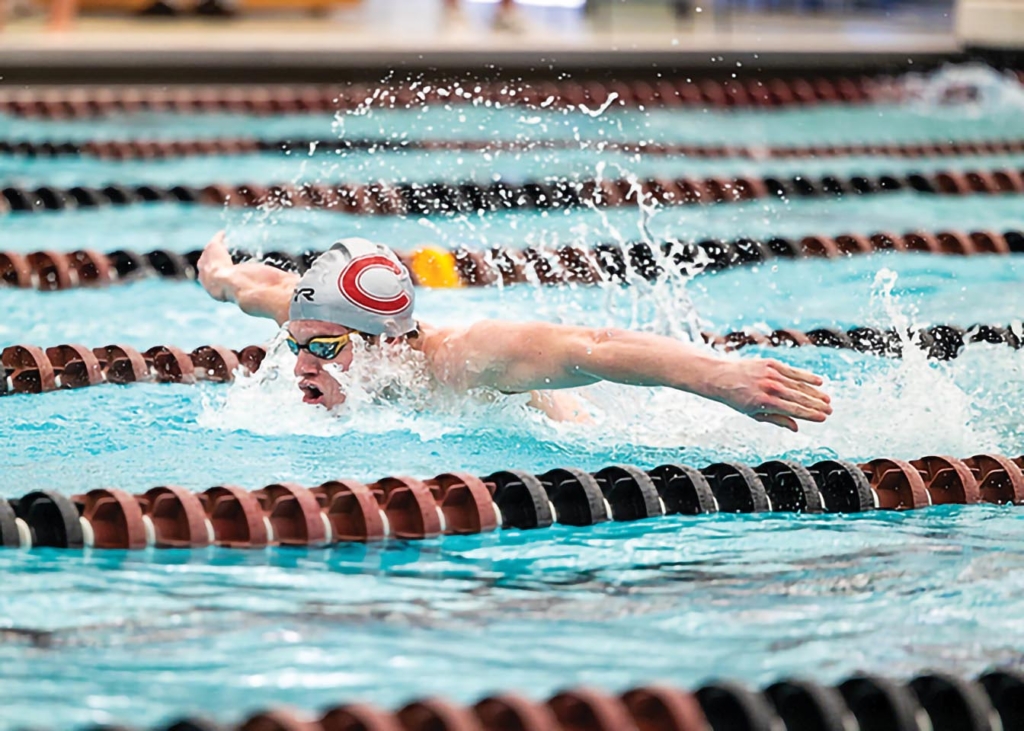
When Matt Freund came to Colgate his senior year of high school for an official visit for the swimming and diving team, “I found my place,” he recalls. “The coaching staff cared a lot about the swimmer as a person, which is different from some places where they just see you as a number,” he says. “And even though I wasn’t [yet] on the team, it felt like I was already part of something, which I didn’t feel anywhere else.”
The swimmer from Green Township, N.J., specializes in the 200 butterfly, 500 freestyle, 100 butterfly, and 200 freestyle. At the Patriot League Championships in February, Freund was part of the 400-relay team that posted the fastest time since the 2015 season. Also, he placed 13th in the 200 butterfly.
Freund is planning to major in neuroscience and is considering a minor in Italian or molecular biology. In his courses so far, Calculus II has stood out: “It was very difficult at times,” he says, “but that was probably the class where I learned the most about myself [in terms of] how to adapt to the learning environment here: how to study properly, get all my work done, manage my time.”
One common theme he’s noticed among the people he’s met at Colgate is that there are a lot of different types of people, “but everyone is similar in that we all want to do well.” He adds, “It’s a competitive school, but it’s nice in that people are willing to help each other out.”
Ultimately, he hopes to enter the medical field, specializing in neurosurgery or neurology. “There are a lot of diseases we have no explanations for, no ways to cure them or treat them, and so many questions that are unanswered,” he notes. “Maybe I can provide an answer.”
Staying Resilient
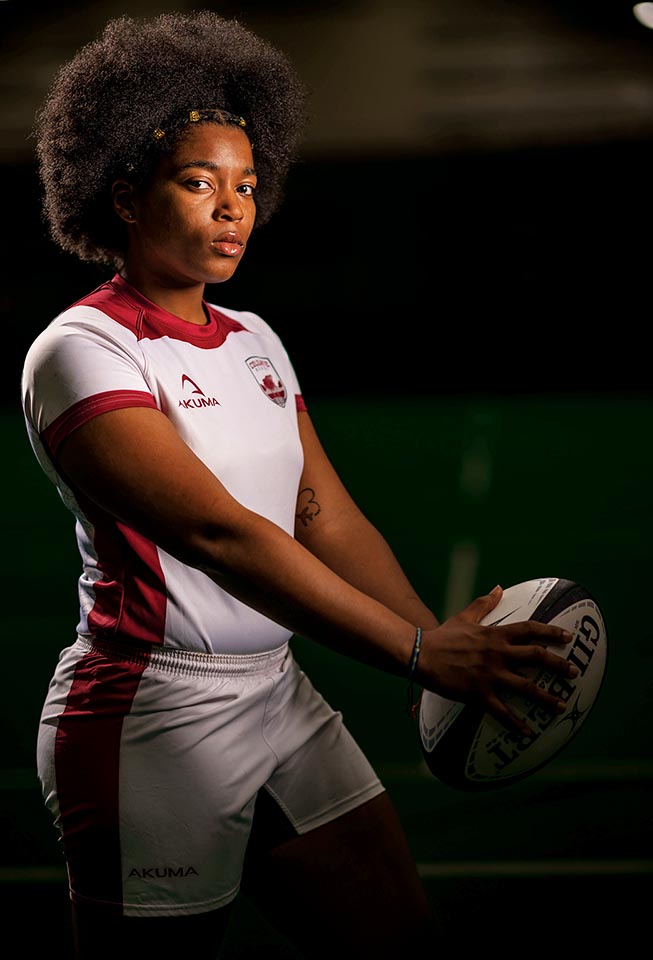
A dislocated jaw that she popped back in place. A hyperextended elbow that didn’t stop her from finishing the rugby match against the University of Pittsburgh (and playing the next match). Zja’Kyla Brumfield is tough — in more ways than physical strength. “I’m no quitter,” she says.
Before coming to Colgate, Brumfield experienced hardships, including grieving the death of her sister and grandmother. But she’s not one to sit around and feel sorry for herself. “You can’t just dwell on the bad things in life. You have to get up, you have to get over it.”
In ninth grade, Brumfield began teaching herself Spanish because she wanted to better connect with the Spanish speakers she knew, including her friend’s mom. Brumfield also now sees the Spanish language as important to her career path because she wants to go into the medical field. She came to Colgate from Jackson, Miss., with the intention of becoming a pediatric neurosurgeon.
As an Office of Undergraduate Studies scholar, she arrived on campus to attend the Summer Institute before her first year officially started. “It gave me insight into campus: which places I enjoyed; I had an early start meeting faculty and staff members; and the classes mentally prepared me for college.”
She is double majoring in neuroscience and history. Her history major will have an emphasis on Black history, which was inspired by the course The History of African American Women with Professor Dionne Bailey. “The professor was phenomenal,” Brumfield says. “I’m so used to going to history classes and learning other people’s history. This class taught me more about my history.”
Somewhat accidentally, Brumfield joined rugby when she randomly sat at a table with the team captains in Frank Dining Hall early in the fall semester. It’s a natural fit because Brumfield played football and soccer in high school. After her first match at Colgate, she became a starter on the team, “and we dominated,” says Brumfield, who is a flanker.
“My teammates are amazing. I love them so much. I feel so included with them.”
In addition, Brumfield is the Colgate football manager, a senator for student government, and she mentors a 6-year-old girl through Sidekicks. She is also on the board for University Church, the Sojourners Gospel Choir president, and a youth teacher at St. Thomas’ Episcopal Church. “I grew up in a church. My papa, he’s now a bishop. My grandma was a prophet. My mom sings for Jesus. My family is really involved with God.”
She says her faith is one reason for her resiliency. “No matter what happens, no matter what I’ll go through, I’ll come out on top because I have God in my life,” Brumfield says, “and because I’m not going to just sit down and take it.”
Making Connections
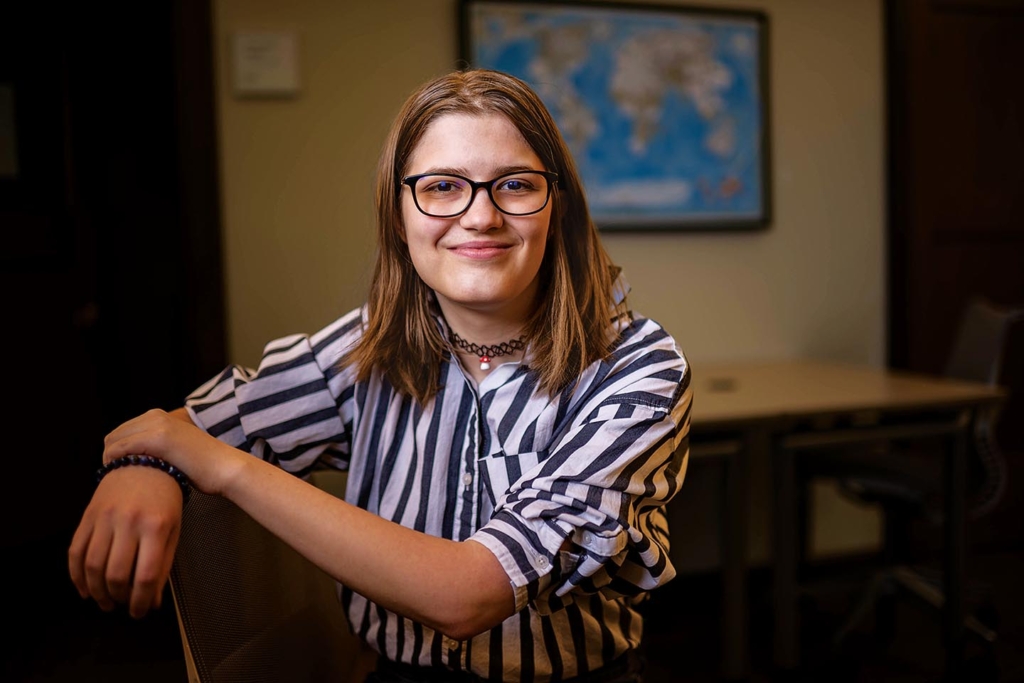
Sarah Kinnard
Hometown: Springtown, Texas
Affiliations: Member of First@Colgate Program (supporting first-generation students), QuestBridge Scholar
Extracurricular activities: Model Arab League, Tea Club, Beyond the Board
Get to know Kinnard: “I’d like to be an interpreter, and I’m learning Arabic. I’ve always been fascinated by languages, and I’d like to learn several fluently over the course of my life. I thought I’d learn one of the more difficult ones on my list now and be able to make a career out of that foundational language as I’m learning others.”
“I’m probably going to declare a Middle Eastern and Islamic studies major, and I’m thinking about pairing that with international relations or peace and conflict studies.”
“Last semester [in Model Arab League], we represented Jordan, and I was on the Joint Defense Council. We’re going to Washington, D.C., this semester to compete.”
“I like making connections between different subjects. [For example,] last semester I was taking Elementary Arabic I and my FSEM was Muslim Cultures and Global Modernity. I was also in CORE India, and even though India wasn’t directly related to either of these classes, it connected to both of them because there’s a good population of Muslims in India still, and a lot of their history has to do with the Muslim rule, so it was highly interrelated. I like to forge those pathways in my learning.”
“[Beyond the Board] is a nerdy club. They have three different sections: Dungeons & Dragons; Magic: The Gathering; and one of them is a weekly meeting of more in-depth board games, like role-playing tabletop games.”
“The best parts [of Colgate] really come if you actively get involved in organizations. When we went to Boston last semester for Model Arab League, that was a great time. And the activities I’ve gone to with my friends are generally some of the most enjoyable things I do.”
Gaining Certainty of Self
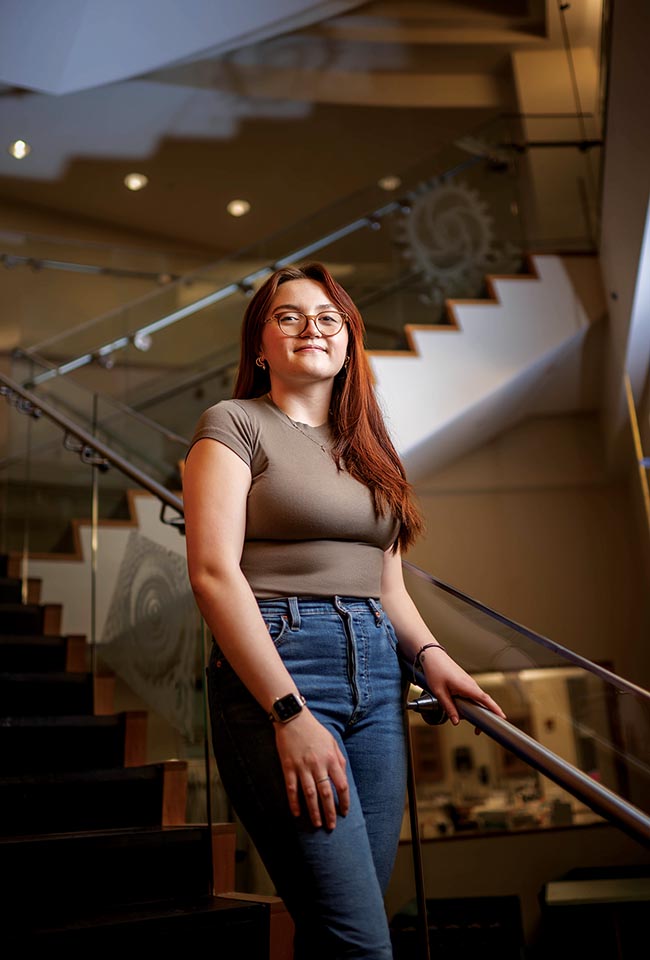
Sarah Than was one of the top-10 seniors — who happened to all be women — in her class at Corcoran High School in Syracuse. “We were the first top-10 all-female class in the school district,” she says. What’s more, Than explains, many of them were first-generation high school students, and many were immigrants. “English wasn’t our first language for most of us,” she adds. “So it was really cool seeing a group of 10 very diverse people all coming together and having that much success.”
Than was raised in a household where she spoke Vietnamese with her family members. She only had a few Vietnamese friends, she says, adding: “It was hard growing up and not having someone to connect with over culture.” She joined a Vietnamese American youth group, which met weekly. “That group offered me valuable life lessons — [especially that] it’s OK to be both Vietnamese and American,” Than says. Her parents faced a lot of backlash as immigrants, she explains, so Than felt conflicted about her identity.
As a high schooler, she also served on New York State Sen. Rachel May’s Youth Advisory Board, which met to discuss issues and policies affecting young people in the state, specifically the 48th Senate District (covering parts of Onondaga and Cayuga counties). The group provided May with insight into and recommendations on topics like environmental justice, environmental racism, and gun violence. “I aligned with a lot of Sen. Rachel May’s political beliefs,” Than says. “I thought it would be good to gain experience with legislation and see how that works, but also work with someone I admire.”
At Colgate, Than is planning on majoring in physics — “because I want to go down the pre-engineering route” — and possibly minoring in mathematics.
Her biggest realization since being at Colgate, Than says, is “being top 10 and receiving great grades all throughout high school, it’s been humbling that I’m not always going to be the best. [But] it’s been a rewarding experience, knowing that I can’t be on top all the time and it’s OK to struggle a bit, it’s OK to ask for help, rather than being so hard on myself constantly.”
Leading by Example
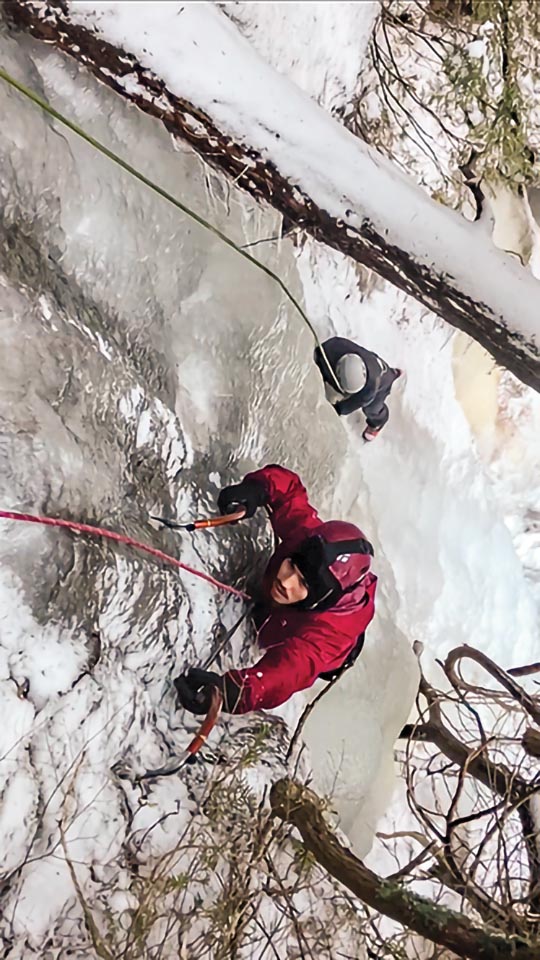
Hanging from a cliff, in frigid temperatures, Onil Carrion might be in pain and tired, but he makes sure he maintains good spirits. “Even though I may hate what’s going on [at that moment], I make sure I have a positive mindset so I keep morale up for the group.”
Carrion is in the final stages of his leadership training for Outdoor Education (OE). Before coming to Colgate from Meriden, Conn., he’d never done anything like ice climbing or kayaking. He joined the group to meet people and learn new competencies. “Basically everything I do here is for the first time; I’ve learned a lot of skills,” he says.
He’s been schooled in teaching others “in a way that is most beneficial for the participant,” as well as physical and mental health first aid. Students may experience homesickness, nervousness, or panic attacks when they’re in the outdoors. “We learned how to listen to somebody and how to validate their feelings,” Carrion says, “making sure that what we do is comforting — good eye contact, making sure that they feel heard and that we’re not afraid to listen to what problems they have.”
Mental health has been important to Carrion since high school, when, as a member of the student council, he organized events to raise awareness of the issue. He had personally struggled with an eating disorder because he was on the wrestling team, which made him weight conscious. Coming to college, “I had personal goals in mind to help better myself as a person so I could love myself,” he says. “Being here has helped me a lot.”
He adds: “Speaking from my own experiences, as a man, a lot of people tend to disregard our mental health, and sometimes we feel like we have to [hide] our feelings. That’s very toxic.”
As a member of the Brothers organization on campus, he hopes to further raise awareness for men’s mental health in the coming years. “Being able to share my feelings with other people and talk about my experiences helps me grow as a person, and that’s something I want to make available to everyone … [so they don’t] have to hold it in and battle it on their own.”
He’s also a member of the club volleyball team and the Clay Club on campus. Carrion is planning to double major in biology and applied mathematics, with a possible minor in computer science. Saying he’s “definitely a logical person,” Carrion intends to enter the field of bioinformatics after graduation.
In the meantime, he says, he’s “growing every day” here.
Setting the Pace
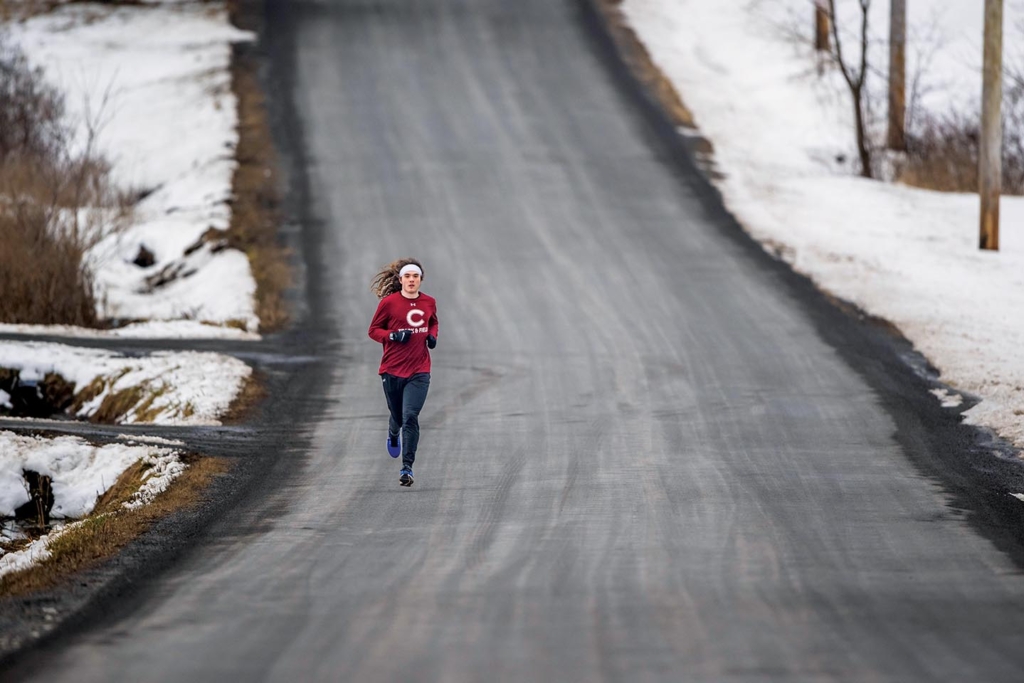
Vincent Ryan thought he was going to attend Syracuse University. “I wanted to go to a bigger school,” he explains. But on the drive north from Morgantown, W.V., his parents suggested a stop at Colgate. Ryan wasn’t interested but agreed to the visit. “I really liked it,” he remembers. Upon seeing the Syracuse campus, he felt like it was too city based for his college preference. The clincher was when he talked to the Colgate track and cross country coaches, who told him he’d be able to continue his running career here. Ryan applied early decision.
In addition to being a runner in high school, Ryan volunteered with the Appalachian Prison Book Project, founded by his mom when he was a baby. The nonprofit has mailed more than 50,000 books to incarcerated individuals in six different states. In return, the volunteers receive thank you letters and sometimes artwork from the recipients. “It’s been a cool experience,” he says.
Ryan lived in Morgantown his whole life, “so coming to Colgate was a little bit more surprising than I thought it would be.” Here’s what he’s gleaned so far:
Team Culture
“The team is great, the coaches are great. It’s been a lot of fun. Running with all those guys and then eating with them in Frank are the best things. The team culture is really good.”
New Experiences
“I had never been to a hockey game before coming here, and now I’ve gone to a bunch — my roommate plays.”
Favorite Class
“I took The Beatles [with Professor Marietta Cheng], and that was my favorite class so far. We’d walk in and there’d be music already playing for the song we were going to analyze that day. We’d talk about all kinds of Beatles songs, who wrote what, how they did it, the effect it had on society… It was a really cool class.”
Hurdles
“The beginning of Calc III was a lot more rough than I thought it was going to be. Mainly because I think I was just so shocked with getting here… I had just moved eight hours away. And I was also dealing with a running injury. I ended up doing very well in the class, and I turned things around. But I did have to overcome that at first.”
Goals
“I know that I’m interested in math and computer science, but I don’t really know what I want to do with them, or even what the options are. That’s one thing I definitely hope to learn while I’m here — that next step, what I’m going to do afterward. I hope to learn something I’m passionate about, something I could see myself doing for quite some time.”
